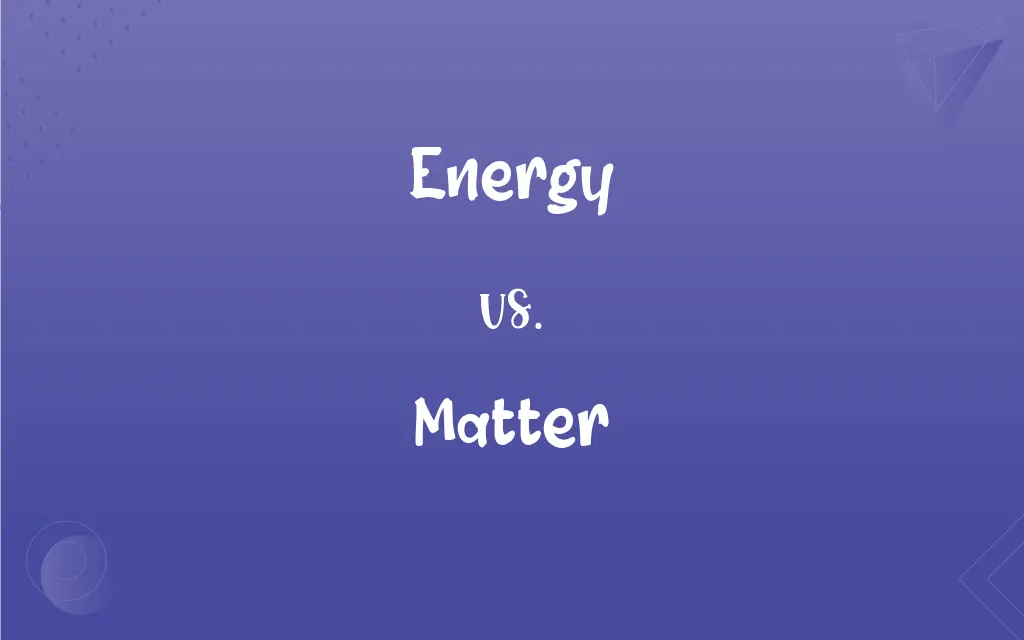Energy vs. Matter: What's the Difference?
Edited by Aimie Carlson || By Harlon Moss || Updated on October 16, 2023
Energy is the capacity to do work or produce heat, while matter is the physical substance that occupies space and possesses mass.

Key Differences
Energy and matter are fundamental concepts in physics. Energy describes the ability to perform work or produce change, while matter represents tangible substances with mass.
Energy can exist in various forms such as kinetic, potential, thermal, and more. Matter, on the other hand, comprises atoms and molecules and can exist in different states like solid, liquid, and gas.
Einstein's theory of relativity introduced the equation E=mc^2, suggesting energy can be converted to matter and vice versa. This means the two are interconnected at a fundamental level.
In everyday observations, energy is often unseen but felt, like the warmth of the sun or the force of the wind. Matter, however, is usually visible and tactile, like a rock or water.
When we consume food, we are taking in matter which our bodies convert into energy to fuel our daily activities, highlighting the relationship and interplay between these two concepts.
ADVERTISEMENT
Comparison Chart
Definition
Capacity to do work or produce change.
Physical substance with mass and volume.
Forms/States
Kinetic, potential, thermal, etc.
Solid, liquid, gas, and plasma.
Interconversion
Can be transformed into different energy types.
Can change states but retains its elemental identity.
Tangibility
Often intangible and felt.
Tangible and often visible.
Conservation
Cannot be created or destroyed, only transformed.
Mass and energy are conserved in reactions.
ADVERTISEMENT
Energy and Matter Definitions
Energy
Vitality required for sustained activity.
After a good night's sleep, she had a lot of energy.
Matter
A topic or subject of interest.
The mystery of the lost treasure became the main matter of discussion.
Energy
The capacity to do work or produce heat.
The battery stores energy for later use.
Matter
Solid particles suspended in a liquid or gas.
The water filter removes suspended matter from tap water.
Energy
Power derived from physical or chemical resources.
The sun provides natural energy to the Earth.
Matter
The substance of which a physical object is composed.
The scientist studied the matter under the microscope.
Energy
A property of objects in motion or at rest.
The rolling ball had kinetic energy.
Matter
Any substance with mass that takes up space.
Air is a form of matter that we cannot see.
Energy
A spiritual force believed by some to reside in living beings.
He felt a positive energy in the room.
Matter
Physical substance in contrast to the mind or spirit.
Philosophers often debate the relationship between mind and matter.
Energy
The capacity for work or vigorous activity
Who has the energy to climb that trail?.
Matter
A type of such substance
Organic matter.
Energy
Also energies Exertion of vigor or power
A project requiring a great deal of time and energy.
Devoted her energies to writing songs.
FAQs
What is energy?
Energy is the capacity to do work or produce heat.
How are energy and matter related?
Through Einstein's equation E=mc^2, energy can be converted to matter and vice versa.
Can matter be created or destroyed?
In standard reactions, matter is conserved, but it can convert to energy and vice versa.
Can energy be created or destroyed?
No, energy cannot be created or destroyed, only transformed.
Are sound waves considered energy or matter?
Sound waves are considered energy, traveling through matter like air or water.
What are the states of matter?
Matter exists primarily in solid, liquid, gas, and plasma states.
Can you give an example of energy conversion in matter?
When wood burns, the chemical energy in the wood converts to heat and light energy.
What is matter?
Matter is the physical substance that occupies space and possesses mass.
How is energy stored in matter?
Energy is stored in matter in the bonds between atoms and molecules.
Can energy exist without matter?
Yes, energy can exist independently, like in the form of light.
What are the main forms of energy?
The main forms include kinetic, potential, thermal, and more.
How does the conservation of energy relate to matter?
The total energy and matter in a closed system remains constant; it merely changes form.
Is light considered energy or matter?
Light is considered energy, specifically electromagnetic energy.
How do we feel or see energy?
We feel or see energy through its effects, like warmth or light.
Why is matter important?
Matter makes up everything we see and touch; it's fundamental to the universe.
How do machines convert energy?
Machines convert energy from one form to another, like turning electrical energy into motion.
What fuels provide energy?
Fuels like gasoline, coal, and natural gas provide chemical energy that can be converted to other forms.
What's the smallest particle of matter?
The smallest particles are subatomic particles like quarks and electrons.
Can matter exist without energy?
No, all matter contains some form of energy, even if at rest.
Are atoms energy or matter?
Atoms are considered matter, but they contain energy in their bonds and movement.
About Author
Written by
Harlon MossHarlon is a seasoned quality moderator and accomplished content writer for Difference Wiki. An alumnus of the prestigious University of California, he earned his degree in Computer Science. Leveraging his academic background, Harlon brings a meticulous and informed perspective to his work, ensuring content accuracy and excellence.
Edited by
Aimie CarlsonAimie Carlson, holding a master's degree in English literature, is a fervent English language enthusiast. She lends her writing talents to Difference Wiki, a prominent website that specializes in comparisons, offering readers insightful analyses that both captivate and inform.































































